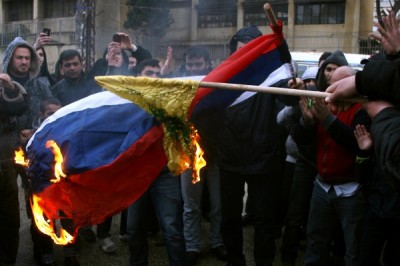 The U.S. and Russia have been sparring all week over competing United Nations Security Council resolutions on Syria. The U.S. would like a mandate under Chapter 7 of UN law to intervene more robustly in what the Red Cross and other international aid groups are now calling a civil war between Bashar al Assad’s regime and opposition groups.
The U.S. and Russia have been sparring all week over competing United Nations Security Council resolutions on Syria. The U.S. would like a mandate under Chapter 7 of UN law to intervene more robustly in what the Red Cross and other international aid groups are now calling a civil war between Bashar al Assad’s regime and opposition groups.
Russia has long opposed such a move, arguing that no state has the right to impose regime change on another state. After all, if the West can throw out any leader they don’t like or who moves to repress opposition, what might they do if Russian President Vladimir Putin were to, say, move tanks into Chechnya and fire on crowds there?
Regime change is never popular with the regimes, or their backers, in question.
From Kosovo to Libya, Russia has increasingly felt encroached upon by the West. And given that Syria is home to the port of Tartus, Russia’s last remaining naval base in the Middle East, there is some question about spheres of influence as well.
So how does the U.S. convince Russia to change course in Syria and stop protecting Assad and the regime?

Adds another senior administration official: “The argument that we and our friends and our partners on Syria have been making to the Russians is that their interests in Syria will be jeopardized by Russian actions. The regime is growing weaker. The Russians are undermining their influence in the next Syrian government by their policies today,” the official said. “We’ve told them that they need to rethink their calculus.”
To that end, the Administration encouraged opposition groups to visit Moscow, which some did last week. They’ve also been emphasizing the agreement between opposition groups in Cairo on a unified transition plan — the first time all the political groups have managed to agree on the rough strokes of what a post-Assad government might look like in Damascus. If the opposition forms a government without Russia, it could derail the process, which is why the U.S. has been encouraging Moscow to become more involved in envisioning a post-Assad Syria even as they prop him up.
“We’re encouraged by what we’ve been hearing of late,” says the senior official. “We think it’s important that Russians talk… After all, they are burning Russian flags, not American flags, not just in Syria but in Cairo and the Gulf.”
So, are the Russians likely to give ground at the UN?
We’re not quite there yet. Part of the problem is the U.S. doesn’t have that much leverage with Russia these days. “The U.S.-Russia relationship isn’t’ worth very much at all,” says Fritz Ermarth, a former National Intelligence Agency director and Russia expert. “They regard the U.S. as a major problem or obstacle in their reconstruction in their status as a global power and they’ve learned from recent experience their senior officers can threaten us with nuclear attack and Washington doesn’t even hiccup,” he adds. “They’re not sacrificing anything in their relationship with the U.S.” by supporting Assad.
That said, with the Russian economy tottering and highly dependent on oil prices remaining high, antagonizing the Gulf States — who essentially control the price of oil — could have serious repercussions for Moscow.
“To our great regret,” Russia Foreign Minister Sergey Lavrov said Monday, “there are elements of blackmail. We are being told that if you do not agree to passing the resolution under Chapter 7 of the U.N. Charter, then we shall refuse to extend the mandate of the monitoring mission,” he adds. “We consider it to be an absolutely counterproductive and dangerous approach, since it is unacceptable to use monitors as bargaining chips.”
Time

Leave a Reply
You must be logged in to post a comment.